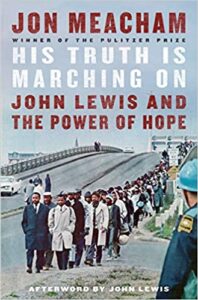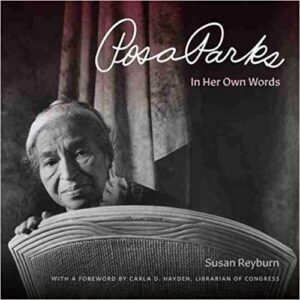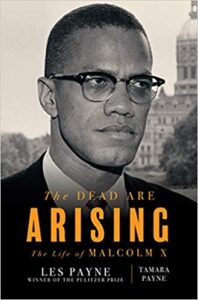We can very well set a mood of peace out of which a system of peace can be built.
– Martin Luther King Jr.
This week we observe the birthday and legacy of the Reverend Dr. Martin Luther King Jr. The renowned civil rights leader, who would have been 92 on January 15, was assassinated in 1968, at the height of his mission to further the civil rights cause through nonviolent resistance.
 Over half a century later, the legacies of Dr. King, and those of his contemporaries of the civil rights era, continue to inspire us. This recently published scholarship is one example: “The sword and the shield: the revolutionary lives of Malcolm X and Martin Luther King Jr.” It is one of the hundreds of books to be found in the New Book collection at A.K. Smiley Public Library.
Over half a century later, the legacies of Dr. King, and those of his contemporaries of the civil rights era, continue to inspire us. This recently published scholarship is one example: “The sword and the shield: the revolutionary lives of Malcolm X and Martin Luther King Jr.” It is one of the hundreds of books to be found in the New Book collection at A.K. Smiley Public Library.
Author of the book, Peniel E. Joseph, a professor of history and the founding director of the Center for the Study of Race and Democracy at the University of Texas at Austin, writes a dual biography of the two leaders. He sets out to prove that Americans’ understanding over the years of the beliefs and actions of the men has become distilled. Joseph asserts that we have come to think of King solely as a pacifist, and of Malcolm X, strictly as a radical revolutionary. He concludes, however, that each man, both of whom were assassinated at the age of 39 within three years of each other, came to learn from the other’s philosophies and incorporated aspects of each other’s beliefs into his own. Joseph asserts, “Martin Luther King Jr.’s promotion of nonviolence as a shield against Jim Crow’s denial of black citizenship sharpened Malcolm’s political sword, placing them in a conversation that would continue beyond death.”
 A young contemporary of Dr. King’s, Congressman John Lewis of Georgia’s fifth district, who died last summer after serving 33 years in the House of Representatives, saw King as one of his teachers in the practice of nonviolence in his civil rights work. A biography of Lewis by Jon Meacham, published in 2020, “His truth is marching on: John Lewis and the power of hope,” is also included in Smiley’s New Book collection. Lewis met King at age 18 and eventually became one of the “Big Six” leaders of the groups who organized the 1963 March on Washington for Jobs and Freedom at which King delivered his “I Have a Dream” speech, calling for an end to racism.
A young contemporary of Dr. King’s, Congressman John Lewis of Georgia’s fifth district, who died last summer after serving 33 years in the House of Representatives, saw King as one of his teachers in the practice of nonviolence in his civil rights work. A biography of Lewis by Jon Meacham, published in 2020, “His truth is marching on: John Lewis and the power of hope,” is also included in Smiley’s New Book collection. Lewis met King at age 18 and eventually became one of the “Big Six” leaders of the groups who organized the 1963 March on Washington for Jobs and Freedom at which King delivered his “I Have a Dream” speech, calling for an end to racism.
 Both Lewis and King were contemporaries of Rosa Parks who, with her refusal to give up her seat on a Montgomery, Ala. bus in 1955, has become an international icon of resistance to racial segregation. She collaborated with civil rights leaders, including King, and her one act of resistance led to the bus boycott by Montgomery’s Black community. Continuing for over a year, the boycott eventually lead to the federal court decision which deemed bus segregation as unconstitutional. “Rosa Parks: in her own words,” also available in the New Book section of the Library, is a fascinating and intimate look at Parks’ experiences. Until very recently her personal papers, kept by the Library of Congress, were unavailable to the public. Take a look at the small volume and see, in her own handwriting, what she thought and felt about the era in which she lived, as well as one hundred photographs from her collection.
Both Lewis and King were contemporaries of Rosa Parks who, with her refusal to give up her seat on a Montgomery, Ala. bus in 1955, has become an international icon of resistance to racial segregation. She collaborated with civil rights leaders, including King, and her one act of resistance led to the bus boycott by Montgomery’s Black community. Continuing for over a year, the boycott eventually lead to the federal court decision which deemed bus segregation as unconstitutional. “Rosa Parks: in her own words,” also available in the New Book section of the Library, is a fascinating and intimate look at Parks’ experiences. Until very recently her personal papers, kept by the Library of Congress, were unavailable to the public. Take a look at the small volume and see, in her own handwriting, what she thought and felt about the era in which she lived, as well as one hundred photographs from her collection.

 If the subject of the civil rights movement and these titles interest you, you may want to investigate another biography of Malcolm X currently out, “The dead are arising : the life of Malcolm X” by Les Payne, and the DVD documentary, “John Lewis : good trouble,” released last year and directed by Dawn Porter. You’ll find both here at Smiley Library.
If the subject of the civil rights movement and these titles interest you, you may want to investigate another biography of Malcolm X currently out, “The dead are arising : the life of Malcolm X” by Les Payne, and the DVD documentary, “John Lewis : good trouble,” released last year and directed by Dawn Porter. You’ll find both here at Smiley Library.
If you’d like to check out these or other Library items, you may do with our Books to Go curbside service. For more information please visit our website, www.akspl.org, or call 909-798-7565.